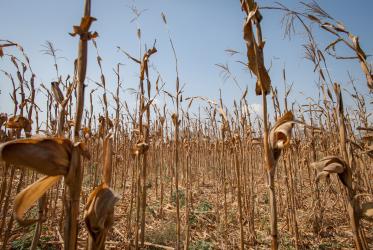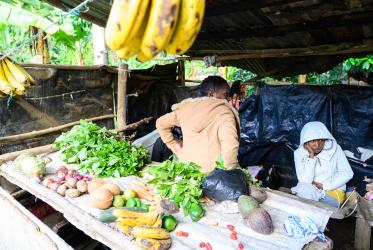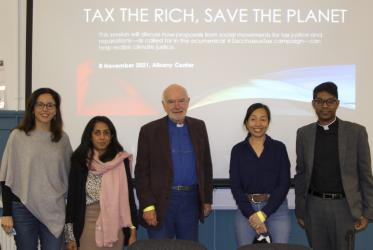Never has humanity lived in a more connected, yet disconnected time! Connected by the endless notifications on our smartphones – alerting us to all the latest news and tidings in our social media, yet not connected deeply enough to respond substantially to people's suffering. Among the many tragedies are the human-made famines in South Sudan, Somalia, North-Eastern Nigeria and in Yemen.
The famine in South Sudan has been precipitated by the struggle for power among the very leaders whose mandate is to protect and serve their people. The sinister networks that benefit from corruption in the trade of the natural resources of the land and the unrestricted trade in arms add fuel to the fire of conflicts.
After decades of struggle, South Sudan emerged as the world's youngest nation, in 2011. But the celebrations were soon forgotten as the nation descended into civil war in December 2013. After the outbreak of conflict in the capital Juba, the war was largely restricted to the northern states, but from July 2016, the conflict had expanded into the southern regions. The conflict has caused tens of thousands of deaths, displacing 2.1 million people within the country, and more than 1.5 million forced out of the country. In the past three years, the people of South Sudan have been subjected to a horrendous level of violence, insecurity, kidnappings, rape, killings, armed attacks and the forced recruitment of child soldiers by opposing groups. There are also signs of new militia groups emerging.
Food is now scarce in many parts of South Sudan. Causes include crop failure; violence and insecurity keeping farmers away from their fields; and food aid not reaching the displaced as well as suffering communities in general due to insecurity and government restrictions.
All this has contributed to the collapse of the economy of South Sudan, with the food prices skyrocketing and the inflation rate approaching 800 per cent.
In December 2016, the UN Security Council rejected a resolution imposing an arms embargo on South Sudan, so the flow of arms to the marauding forces and militias continues unabated. While 13,500 UN peacekeepers are struggling to keep the peace, in January 2017, the South Sudan government rejected a proposal to add 4,000 more UN peacekeeping troops.
On the 20 February, the downward spiral reached a new low, with famine declared in parts of South Sudan, with more than 100,000 people in two counties of its Unity State facing starvation, with a further one million people classified as being on the brink of famine. Some have already died of hunger. More than one million children are estimated to be acutely malnourished. Now more than 40 per cent of the population, (4.9 million people), are in need of food aid, and the needy are set to rise to 5.5 million by July, if the crisis is not addressed sufficiently.
The churches and ecumenical movement have accompanied the people of South Sudan through the decades. In 1972, the World Council of Churches and the All African Conference of Churches helped broker the ‘Addis Ababa Agreement’ that helped establisha degree of autonomy for the Southern Sudan Autonomous Region and peace from 1972 to 1983.
In spite of tribalism and divisions that even affect churches, Christianity binds the people of South Sudan together. the Roman Catholic Church, the Episcopal Church of South Sudan and other churches which have membership across all major tribal groups have a strong chance to bring peace among the warring sides.
Now, Churches and church-related organisations and ecumenical partners, together with international organisations and partner countries, are striving to respond to this emergency. But the response to international appeals is still completely insufficient. The months of March and April present a rapidly closing window of opportunity in this crisis, where a lasting impact can be made in South Sudan. Since many of the displaced had to flee with just the clothes they were wearing, they require seeds and basic equipment to cultivate the lands where they now live.
Their ability to plant the seeds before the rainy season starts is crucial to avert hunger in the coming months. From May, most roads will become impassable, necessitating expensive air drops of aid.
On our Pilgrimage of Justice and Peace, during this period of the Holy Lent, let us to reflect on how we pray, act and engage with South Sudan, to promote peace and sustenance, so people can live their lives in all its’ God given fullness!
Is not this the fast that I choose:
to loose the bonds of injustice,
to undo the thongs of the yoke,
to let the oppressed go free,
and to break every yoke?
Is it not to share your bread with the hungry,
and bring the homeless poor into your house;
when you see the naked, to cover them,
and not to hide yourself from your own kin?
Then your light shall break forth like the dawn,
and your healing shall spring up quickly; ( Isaiah 58: 6-8)
Read also:
Urgent international assistance sought by South Sudan Council of Churches (WCC press release of 2 March 2017)





